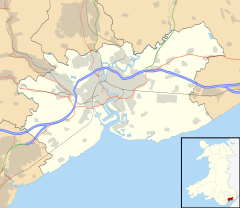Carleon
Caerleon
|
|
|---|---|
 A view of Caerleon from St Julians, Newport |
|
| Caerleon shown within Newport | |
| Population | 8,061 (2011 census) |
| OS grid reference | ST336909 |
| Principal area | |
| Ceremonial county | |
| Country | Wales |
| Sovereign state | United Kingdom |
| Post town | NEWPORT |
| Postcode district | NP18 |
| Dialling code | 01633 |
| Police | Gwent |
| Fire | South Wales |
| Ambulance | Welsh |
| EU Parliament | Wales |
| UK Parliament | |
Caerleon (/kərˈliːən/; Welsh: Caerllion) is a suburban town and community, situated on the River Usk in the northern outskirts of the city of Newport, Wales. Caerleon is a site of archaeological importance, being the location of a notable Roman legionary fortress, Isca Augusta, and an Iron Age hillfort. The Wales National Roman Legion Museum and Roman Baths Museum are in Caerleon close to the remains of Isca Augusta. The town also has strong literary associations, as Geoffrey of Monmouth makes Caerleon one of the most important cities in Britain in his Historia Regum Britanniæ, and Alfred Lord Tennyson wrote Idylls of the King while staying there.
Caerleon is a site of considerable archaeological importance as the location of a Roman legionary fortress or castra. It was the headquarters for Legio II Augusta from about 75 to 300 AD, and on the hill above was the site of an Iron Age hillfort. The Romans called the site Isca after the River Usk (Welsh Wysg). The name Caerleon may derive from the Welsh for "fortress of the legion"; around 800 AD it was referred to as Cair Legeion guar Uisc.
...
Wikipedia

